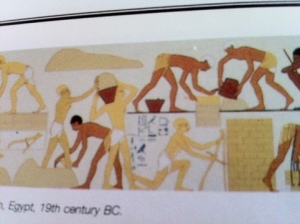We’d come to the end of another Saturday lunch at P.F. Chang’s, and I was chewing gum so that if I got pulled over at a police checkpoint my breath wouldn’t smell like gluten-free ginger chicken with broccoli. I turned the ignition, adjusted the rearview mirror, released the emergency brake, popped in my “Drive Time Gaelic” compact disc, and put the car in reverse. And then I realized I couldn’t see to my left because we were flanked by a van that had plunged my gluten-free sedan into night.
“How am I supposed to see around this thing?” I asked my wife who was gazing into a compact mirror by the light of her smartphone. The van had a sticker on the rear right passenger bay window. It said, “I brake for large objects.”
Then I remembered a scene from the World War II movie Saving Private Ryan. I asked my wife for her compact mirror. Then I took the gum out of my mouth and stuck it to the back of mirror. I affixed the mirror and gum to the snow scraper that had been lying idle on the floor of the backseat, opened my window, and stuck the whole apparatus out and angled the mirror so that I could see around the van. It was the most use the scraper got all season.
“I think I can pull out after this Honda and Panzer tank,” I said.
“Okay, Field Marshal. But you’re buying me a new mirror.”
I got pretty handy with the scraper-scope. Any time I needed to see around a Suburban or Avalanche or Hummer, I just stuck the scope out the window and ignored the birds that came to perch. Sure there were stares from passerby, and even a few inquiries from police officers who wanted to know which facility I’d escaped from. But soon everyone recognized me, like you recognize that guy who drives around with a flag on his antenna that says, “Make Lemon Bars, Not War.”
Then one day I noticed other people with scraper-scopes. Except they didn’t all use scrapers and compact mirrors. Some used dentist’s mirrors. Others used shaving mirrors with metal accordion extenders. I even saw someone who had trained his dog to stick its head out the window, carrying in its mouth a long bone that had been wrapped in reflective foil. We the oppressed…we the downtrodden…we the great unwashed masses of coupe-, sedan-, smart-, and zip-car drivers were united in our quest to behold the other side of sport utility vehicles. When we passed on the highway we would waive to each other with our scopes.
It was another Saturday afternoon and I was in my car, savoring the interplay of the gluten-free “Buddha’s Feast” with the flourless chocolate dome. As usual my car was in eternal night thanks to a Dodge Durango and a minivan with seven gables. I stuck out my scraper-scope, angled it to see what I could see, and just happened to focus the mirror on the mirror of another scope sticking out of a Civic three spaces down. The two mirrors instantly produced an infinite number of smaller and smaller reflections inside each other, ending in a point of light so blazing that I was unable to see for a few moments.
And when the purple splotches finally cleared from my vision, there was nothing left of the compact mirror but some smoldering dust.
“Well, that’s it,” I said to my wife. “That was our only hope of getting out of here. Now we’ll have to wait until our sun becomes a super nova and swallows up all the SUVs on Earth.” I started looking for something good on the radio.
“Is that all?” she asked me.
I thought for a few seconds.
“Or I guess I could always back out slowly.”

